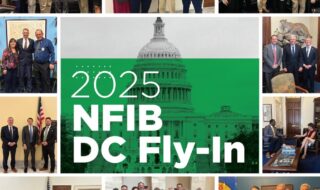Topics:
April 19, 2022 Last Edit: June 5, 2025
Small Business Watches Vermont Legislature Warily
- 159, omnibus legislation intended to support economic development and workforce revitalization also includes further minimum wage increases, the imposition of a new $25/child unemployment benefit and the establishment of a task force to study a paid leave insurance program.
State:
Get to know NFIB
NFIB is a member-driven organization advocating on behalf of small and independent businesses nationwide.
Related Articles


July 3, 2025
NFIB Thanks Congress for Passing Landmark Small Business Tax Re…
NFIB applauds Congress for passing the One Big Beautiful Bill Act, which in…
Read More


July 2, 2025
NFIB Key Votes One Big Beautiful Bill Act in U.S. Senate and Ho…
NFIB key votes the One Big Beautiful Bill Act in the 119th Congress and urg…
Read More


July 2, 2025
Small Business Owners Push Priorities in Capitol Hill Meetings
Over 80 small business owners attended NFIB’s annual Fly-In. They attende…
Read More







